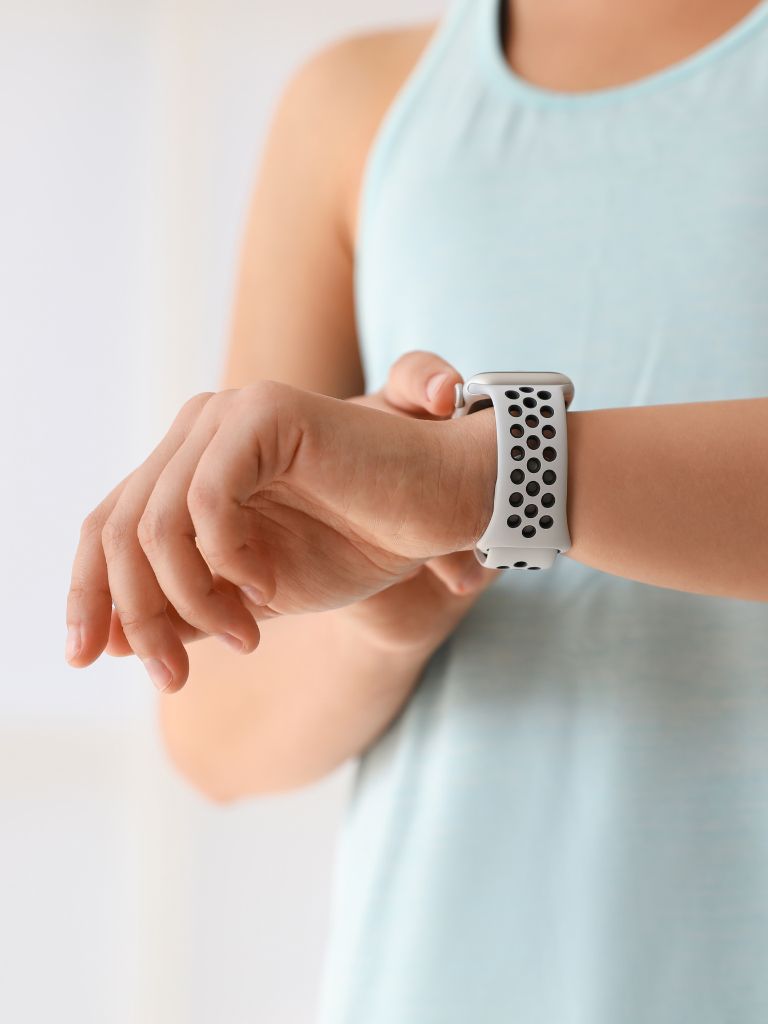Unravelling the mysteries of optimal health has long been a pursuit that captivates the human imagination. Many of us yearn for that elusive state of well-being, where our bodies and minds harmoniously thrive. But what if there was a way to gain unprecedented insights into our own biology, like a window into our inner workings?
Enter the revolutionary realm of health technology, where cutting-edge advancements and data-driven precision intersect. By harnessing the power of tracking our biomarkers, we can unlock a treasure trove of information, empowering us to make informed decisions, take control of our well-being, and embark on a journey towards a healthier, more vibrant life.
In this article, we’ll explore the world of health technology and its practical applications. Discover the key biomarkers that can be effectively tracked using the wide range of available devices as well as the pros and cons associated with using these devices. Additionally, we’ll provide insights into the specific technology utilised by the team here at Melbourne Functional Medicine.
What is health technology?
Health technology refers to a wide range of devices, applications, and systems designed to improve and optimise health and well-being.
It encompasses various tools, such as:
- wearable fitness trackers (e.g. Fitbit, Garmin)
- sleep and activity trackers (e.g. Oura ring)
- mobile apps for tracking nutrition and exercise (e.g. MyFitnessPal)
- remote monitoring devices (e.g. Withings Health Mate, Omron)
- advanced medical devices (e.g. Vively)
- sleep improvement devices (e.g. Ooler, Sleep Eight)
- yoga and meditation apps (e.g. Down Dog, Calm)
These technologies provide valuable data and insights about our bodies, helping us track vital signs, monitor activity levels, manage chronic conditions, and make informed decisions regarding our overall health.
By harnessing the power of health technology, you can actively participate in your own wellness journey, gain a deeper understanding of your body, and make positive changes to enhance your health and well-being.
What is a biomarker?
A biomarker is a measurable indicator or characteristic that provides information about a biological process, condition, or disease state in the body.
Biomarkers can be various substances or physical features, such as proteins, hormones, genetic markers, or even specific physiological changes.
These markers are often used to assess and monitor health, diagnose diseases, track treatment effectiveness, and predict or prevent certain conditions.
By analysing biomarkers, you can gain valuable insights into the body’s functioning, helping you to make informed decisions about your health.
Which specific biomarkers can be tracked using modern health tech devices?
The key biomarkers that can be tracked vary depending on the specific health and wellness goals. However, some commonly tracked biomarkers include:
- blood pressure
- heart rate
- body temperature
- sleep patterns
- physical activity levels
- heart rate variability (HRV)
- blood glucose
- cholesterol levels
- stress indicators
These biomarkers provide valuable insights into various aspects of our health, allowing us to make informed decisions and take proactive steps towards optimising our overall well-being.
Exploring vital biomarkers: Stress, sleep, and blood glucose monitoring
We’ve identified the key indicators that we believe offer crucial information for achieving your wellness goals around stress, sleep and blood glucose monitoring.
Stress
HRV: A measure of the balance of the sympathetic and parasympathetic branches of the autonomic nervous system. Higher heart rate variability is associated with lower physiological stress.
Other biomarkers such as resting heart rate, blood pressure, and electrodermal skin conductance are also useful for measuring the effects of stress on the body.
Devices such as the Oura ring can be comfortably worn to monitor HRV and other biomarkers throughout the day and night.
Sleep
Duration and quality of sleep: A sufficient amount of good quality sleep is one of the single most important factors for health and well-being. Sleep trackers such as Fitbit, Garmin or the Oura ring will measure one or more of several biomarkers such as resting heart rate, blood oxygen levels, heart rate variability, body movement, and body temperature, to determine total sleep time, percentage of deep versus REM sleep, and restlessness during sleep, to give a sleep score for the overall quality of a person’s sleep.
Body temperature: Good quality sleep is dependent on a reduction in core body temperature that occurs after sunset in the few hours leading up to sleep, and is maintained overnight until just before waking the next morning. Being too warm or hot in bed disturbs sleep and reduces sleep quality. Bed cooling systems such as Ooler or Sleep Eight help to reduce body temperature in bed and improve sleep quality.
Blood glucose
Blood glucose levels: Continuous glucose monitors are valuable devices for helping to monitor and track the effects of diet and fasting on blood glucose levels. Elevated blood glucose levels are associated with poor diet and lifestyle, stress, and the development of insulin resistance, Type 2 Diabetes, and hormonal imbalances. Devices such as Vively connect to an app on your smartphone that enables you to track your blood glucose levels in real-time.
For accurate tracking and interpretation of these biomarkers, we recommend seeking the guidance of a healthcare professional to ensure you receive accurate and personalised insights about your biomarker data.
Pros and cons of using health technology devices to track biomarkers
It’s important to maintain a balanced approach when using health technology devices for biomarker tracking.
Whilst these devices offer valuable insights, they should be seen as complementary tools alongside professional advice.
By combining the data from these devices with personalised guidance from a healthcare professional, you can optimise your health journey and make informed decisions about your well-being.
Pros of using devices to track key biomarkers
- Provides valuable data and insight into the effectiveness of diet and lifestyle strategies to improve health and well-being
- Empowers the individual to take a proactive approach to health and wellbeing
- Collects data on the effectiveness of approaches to improving health wellbeing and shows improvement over time
- Helps to regulate the body’s physiology and improve function
Cons of using devices to track key biomarkers
- Whilst cost-effective options are available, quality is key, meaning that quality devices can often be more expensive
- Many devices are Wifi and Bluetooth enabled, so should be set to flight mode when not required to be connected, especially during sleep.
- The data will still be stored in the device and then transferred to the app when enabled
What are the team at MFM using?
Let’s take a peek at the tools and trackers some of the team members at Melbourne Functional Medicine are using to optimise their health and well-being.
Functional Medicine Practitioner Rebecca uses the Waking Up app and says “I recently started using the Waking Up app. I like the structure of the introductory course that has achievable guided meditations, alternated with educational moments about the brain, mind, thoughts, and psyche, and how meditation influences all of that. This element really encourages me to continue meditating and I look forward to it”.
The Oura ring is popular amongst the health coaching team.
Health coach Liv uses the Oura to primarily track sleep and stress. “It’s for people who want to keep track of how ready their body is to take on physical and mental load each day”. You can read more about Liv’s thoughts on the Oura ring in her article: 3 things I learned from my Oura ring (a health coach’s perspective).
Health coach Bee says “[the Oura ring] points me to the areas I need to pay most attention to, it offers monthly trends and even shows you in the daily sleep report if you’re achieving your sleep mid-point indicating a regular sleep cycle. I’m driven to be more active by the movement metrics, and I’m keen to see the trends in my HRV as I participate in Mindful In May.”
Fiona, our SEO Manager, enjoys a range of apps for meditation including Calm, Insight Timer, and Ten Percent Happier which “have all helped me build regular meditation practice into my day. Each of the apps offers a default daily meditation or you can tailor the meditation to best suit you and your meditation goals. Ten Percent has an introductory course if you’re new to meditation, so you can learn the basics and develop your meditation skills over time.” Fiona is also keen on getting her regular dose of Yoga using the Down Dog app. “This app is very user-friendly and easy to navigate regardless of your level of experience, and includes styles from Hatha, Vinyasa, Ashtanga, Yin, Restorative, and Yoga Nidra.”
As for me, I’ve been using the Calm Palm device to see if it can help to improve sleep, and I can certainly say it has been useful for sending me straight off to sleep before I ever reach the end of the 20-minute cycle. I’m interested in tracking my sleep quality over time to see if it improves with the Calm Palm, which uses a gentle electro-stimulus on an acupuncture point on the palm of your hand and is reported to benefit people with anxiety or poor sleep.
Choosing the device that’s right for you
There is an enormous array of health technology available these days to help us track multiple biomarkers of health, fitness, and physical, and mental well-being.
Determining the best health tech devices for you depends on your specific health goals and preferences. Consider factors such as:
- your specific health goals (E.g. improving fitness and recovery, improving sleep, reducing stress or improving the
- body’s stress resilience, or enhancing overall wellness)
- the biomarkers you want to track (E.g. blood glucose levels)
- the level of accuracy and ease of use you require
- the features that align with your lifestyle
Often a single device will be able to track multiple biomarkers such as sleep duration, quality, and restfulness, HRV, resting heart rate, ECG, diet, hydration, weight, and blood pressure and oxygen saturation.
Several apps are available that enable you to combine the data from multiple devices into a single dashboard for easy reference.
Take the time to research the options available, such as:
- wearable fitness trackers
- smartwatches
- mobile apps
- specialised medical devices
Reading user reviews and consulting with healthcare professionals can also provide valuable insights.
Health technology devices are like our personal health detectives, uncovering valuable insights into our well-being. They empower us to make informed decisions and take charge of our health journey. If you’re eager to embrace the wonders of health tech, get in touch with us at Melbourne Functional Medicine.

